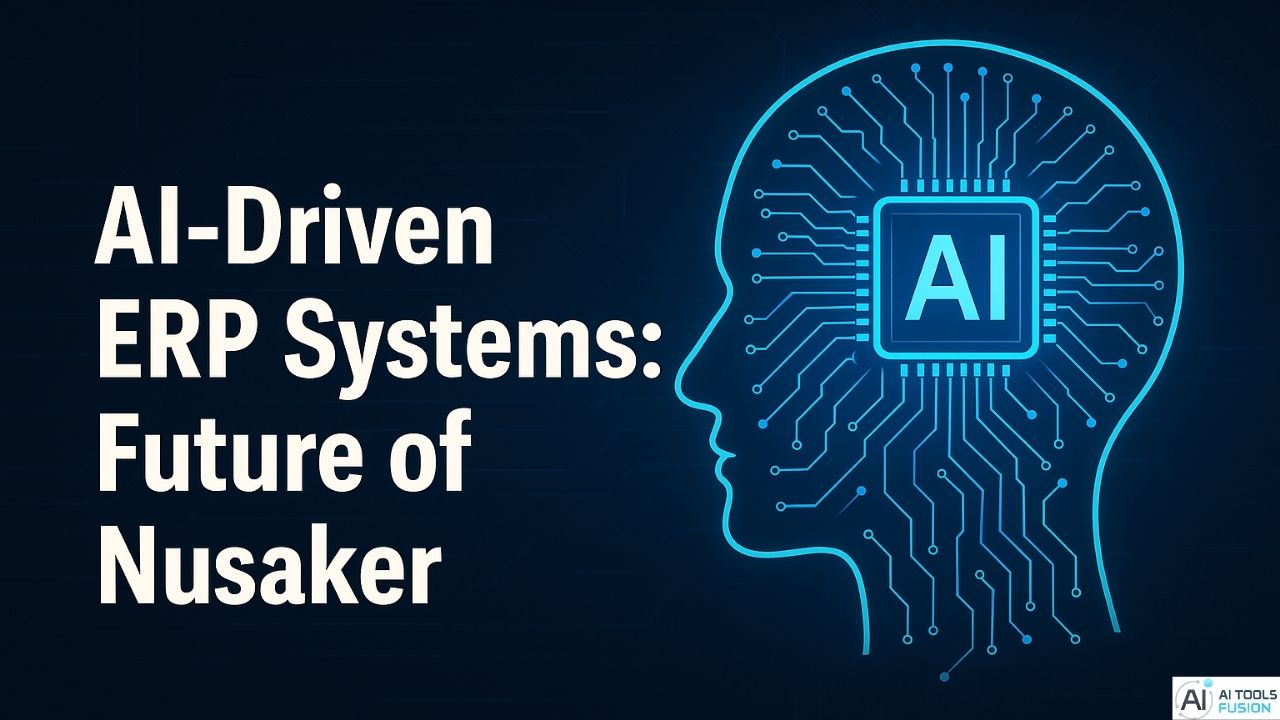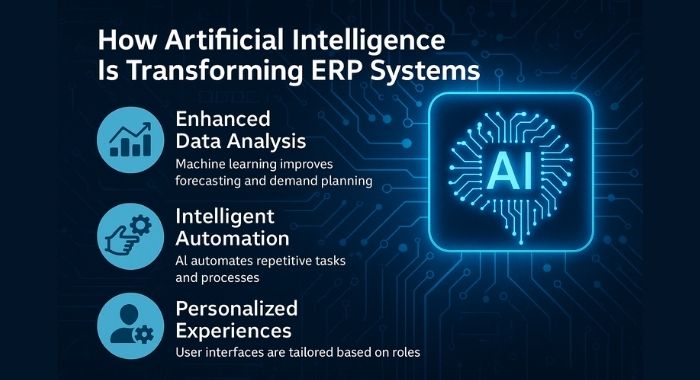AI Driven ERP Systems Future of Nusaker: Pioneering Tomorrow

AI Driven ERP Systems Future of Nusaker: Nusaker leads the charge by integrating Artificial Intelligence (AI) into Enterprise Resource Planning (ERP) systems in today’s rapidly transforming business technology landscape. As organizations strive for enhanced efficiency and sharper decision-making capabilities, these AI-powered ERP systems are emerging as a pivotal force, streamlining operations while offering unparalleled insights through predictive analytics and intelligent automation. This article explores Nusaker’s pioneering role in this technological frontier, leveraging AI to redefine business processes, optimize resource management, and propel companies toward a smarter, more agile future in the digital age.
Table of Contents
Understanding AI-Driven ERP Systems
Defining AI-Driven ERP Systems
AI-driven ERP systems integrate artificial intelligence technologies like machine learning and natural language processing to enhance enterprise resource planning platforms. By automating complex processes and driving informed decision-making, these systems transform traditional ERP tools into intelligent allies for businesses. They enable seamless data processing, offer predictive analytics, and personalize user experiences, consequently boosting operational efficiency and strategic insight.
Benefits of AI Integration
AI-driven ERP systems deliver significant advantages, such as automating repetitive tasks to improve productivity and providing real-time insights for optimizing operations. These systems also offer scalability and enhance customer interactions through predictive solutions, allowing businesses to stay adaptive to market changes.
Challenges in Implementation
Despite their benefits, AI-driven ERP systems present integration challenges, necessitating clean data and specialized expertise for effective deployment. Companies often face hurdles related to data quality and organizational changes.
The Evolution of ERP Systems: From Basic Management to Intelligent Operations
Early Developments and Foundations
ERP systems originated with basic inventory control packages in the 1960s, designed to aid manufacturers in managing stock levels. As technology advanced, these systems evolved into Material Requirements Planning (MRP) and then to Manufacturing Resource Planning (MRP II) during the 1970s and 1980s. MRP II incorporated broader manufacturing processes, providing a more comprehensive resource management tool.
Expansion and Integration
The 1990s marked a pivotal shift with the advent of Enterprise Resource Planning (ERP), which integrated various business functions into a singular, interconnected system. This provided a unified database for finance, sales, HR, and more, enabling organizations to streamline processes and enhance operational efficiency. The move towards web-based solutions in the late 1990s improved accessibility and reduced costs.
Modern Intelligence and Future Directions
The AI Driven ERP Systems Future of Nusaker is heavily influenced by the recent inclusion of next-generation technologies such as AI, Machine Learning, and IoT. These advancements are transforming ERP systems into intelligent operations platforms, capable of automating tasks, providing predictive analytics, and integrating seamlessly with other business technologies. This intelligent transformation is essential for keeping pace with the rapidly changing business landscape.
How Artificial Intelligence Is Transforming ERP Systems

Enhanced Data Analysis
Artificial intelligence (AI) has revolutionized data analysis within ERP systems by using machine learning algorithms to extract valuable insights from large datasets. This advanced capability allows organizations to make data-driven decisions, offering significant improvements in forecasting and demand planning. Leveraging AI, ERP systems can identify patterns and trends, supporting businesses in preparing for market shifts and optimizing inventory levels efficiently. Such predictive analytics are pivotal for strategic decision-making and strengthening competitive advantages in the AI Driven ERP Systems Future of Nusaker.
Intelligent Automation
AI-powered automation in ERP systems facilitates the simplification of repetitive and routine tasks, reducing the risk of human error. By automating processes such as data entry and customer service interactions, these systems enhance operational efficiency. The resultant reduction in manual intervention not only cuts down on errors but also allows employees to focus on higher-value activities. NetSuite’s AI-native functionalities, for instance, illustrate the power of automation in streamlining business operations.
Personalized Experiences
AI enables the customization of user interfaces within ERP systems, offering tailored experiences based on user roles. This personalization aids in presenting pertinent insights for distinct functions and supports swift decision-making. Natural language processing enhances user interactions by allowing natural language queries, empowering non-technical users to access critical data effortlessly. Improved user engagement and faster strategic planning become achievable through this personalization, marking a significant transformation in the AI Driven ERP Systems Future of Nusaker.
What Is the Best AI for ERP?
Key Players in the Field
Identifying the best artificial intelligence platforms integrated into ERP systems is crucial for businesses envisioning the AI Driven ERP Systems Future of Nusaker. Companies like Microsoft, Oracle, and SAP have been leading the charge in embedding AI within their ERP solutions. For instance, Microsoft’s Power BI with AI visuals offers robust data visualization and predictive analytics, enabling informed decision-making.
Advanced Features of AI-Driven ERP
AI-driven ERP systems are not just about automating tasks; they provide a comprehensive range of features designed to boost operational efficiency. From anomaly detection and predictive maintenance to conversational AI and intelligent virtual assistants, these features work together to transform mundane processes into innovative operations.
Considerations for Adoption
While AI holds significant promise, its integration into ERP systems presents challenges. As businesses plan for the AI-driven future, they must prioritize not just the technology but also strategic change management to fully harness the potential of AI in ERP solutions. It’s about melding technological capability with organisational readiness.
Key Benefits of AI-Driven ERP Systems for Businesses
Enhanced Decision-Making and Forecasting
AI-driven ERP systems significantly bolster businesses’ decision-making and forecasting capabilities. Advanced algorithms analyze vast data sets in real time, providing managers with actionable insights that guide strategic decisions. By leveraging these systems, companies can anticipate market trends and adjust operations accordingly, reducing risks and capitalizing on opportunities. This, in turn, facilitates proactive management and is central to the AI Driven ERP Systems Future of Nusaker.
Operational Efficiency and Cost Savings
These innovative systems streamline operations by automating repetitive tasks, thereby improving efficiency and liberating employees to focus on more complex, high-value activities. As a result, businesses experience significant cost reductions. The integration of AI in ERP systems also limits human errors in data processing and entry, further enhancing productivity.
Customer Experience and Personalization
AI-powered ERP systems enrich customer interactions by offering personalized experiences based on thorough analyses of customer behavior. This capability not only boosts satisfaction but also strengthens customer loyalty, fostering long-term relationships. Systems like these transform the customer service landscape, allowing businesses to remain competitive in an ever-evolving market.
Scalability and Security
One of the salient features of AI-driven ERP systems is their scalability. They empower businesses to expand seamlessly without the need for additional resources. Alongside scalability, these systems enhance security with features designed to detect potential threats, maintaining the integrity of business operations. Real-time anomaly detection ensures a robust defense against data breaches, supporting businesses in safeguarding sensitive information.
How AI Is Transforming Key Business Functions Through ERP
Finance and Accounting
AI-driven ERP systems are revolutionizing finance and accounting by automating mundane tasks such as reporting, processing payables and receivables, and managing expenses. This transformation permits financial teams to focus on strategic tasks like financial analysis and forecasting. By integrating AI, businesses can achieve enhanced accuracy and efficiency, leading to more effective resource allocation and timely financial reporting.
Supply Chain Management
The integration of AI into ERP systems significantly impacts supply chain management. AI-enhanced predictive analytics enables companies to anticipate demand fluctuations, optimize inventory levels, and streamline operations. Businesses can proactively adjust supply chain strategies to avert disruptions, ensuring efficient production and timely deliveries. This optimization fosters cost savings and improves customer satisfaction through more reliable service.
Customer Experience
AI-powered ERPs leverage chatbots and virtual assistants to enhance customer service. These tools provide instant support, resolving common queries and improving response times. Additionally, AI personalizes customer interactions by tailoring recommendations and communications, thereby increasing engagement and satisfaction. As businesses increasingly adopt AI-driven ERP solutions, such enhancements will become critical components of competitive customer service strategies.
Why AI-Driven ERP Is Crucial for Nusaker’s Growth
Enhanced Decision-Making and Efficiency
AI-driven ERP systems are pivotal for Nusaker’s future as they empower businesses with smarter decision-making capabilities. By leveraging advanced features like predictive analytics and machine learning, organizations can analyze vast datasets for actionable insights. This enables more strategic resource allocation and optimizes inventory management, enhancing overall efficiency and reducing operational costs. Additionally, these systems facilitate quick adaptation to market changes, providing a significant competitive edge.
Streamlined Operations
These systems automate repetitive tasks, freeing employees to focus on strategic, high-value activities that contribute directly to Nusaker’s growth. With real-time insights, AI-enabled ERP systems improve accuracy in demand forecasting and supply chain management, ensuring that operations run smoothly. Ultimately, such efficiency is paramount in driving seamless business operations and enhancing customer satisfaction.
Enabling Scalability and Adaptability
For a company like Nusaker poised for expansion, scalability is crucial. AI-driven ERP systems allow for dynamic resource allocation and can scale up or down based on real-time demand. This flexibility not only supports growth but also ensures the organization can swiftly adjust to any unforeseen external changes, maintaining stability and competitiveness in a rapidly evolving market.
Future Trends in AI-Driven ERP Systems (2025-2030)
Increasing Cloud ERP Adoption
The next half-decade will witness accelerated adoption of cloud ERP, driven by enhanced scalability, remote access capabilities, and improved cost-efficiency. The integration of AI and machine learning promises not only process automation but also predictive analytics, streamlining operations and enriching user experience. By 2030, cloud ERP solutions are expected to expand into emerging markets, marking a significant shift towards increased digital transformation and capturing the rise of SMEs.
AI and Machine Learning Integration
AI-driven ERP systems will continue to evolve, embedding AI across processes and interactions to create what McKinsey refers to as ‘data ubiquity’. This will enable automated actions while maintaining human oversight and enhance trust in these systems. Organizations will focus on customizing AI models with proprietary data to unlock competitive advantages.
Industry-Specific Solutions and Security
ERP vendors will develop more industry-specific solutions to meet diverse sector needs, such as manufacturing and healthcare. Emphasis on cybersecurity will intensify, focusing on end-to-end encryption and AI-driven threat detection to secure data environments of AI-driven ERP systems. These trends underscore the strategic imperative of ERP modernization, ensuring that the AI Driven ERP Systems Future of Nusaker remains at the forefront of technological innovation.
FAQs

What Are AI-Driven ERP Systems?
AI-driven ERP systems integrate advanced technologies such as machine learning, natural language processing, and predictive analytics with traditional enterprise resource planning functions. These systems transform static data hubs into dynamic platforms, offering intelligent insights and autonomous decision-making capabilities. For Nusaker, a grassroots nonprofit network, adopting an AI-driven ERP has revolutionized donor management and community outreach by streamlining operations and enhancing impact.
What Advantages Do They Offer?
Key benefits of AI-driven ERP systems include automation of routine tasks, enhancement of operational efficiency, and provision of real-time analytics. Nusaker’s utilization of this technology underpins its ability to personalize services and scale effectively, while significantly reducing operational costs and manual processing time. According to recent studies, such systems typically deliver a 15-25% reduction in costs and improve forecast accuracy by 20-30%.
What Challenges Might Nusaker Face?
Implementing AI-driven ERP systems comes with challenges, including high upfront costs, integration with existing systems, and managing change resistance among users. For Nusaker, ensuring data quality and addressing potential security and compliance concerns are paramount. Overcoming these hurdles involves strategic planning and leveraging existing AI-enhancing tools, such as add-ons for existing platforms like Microsoft Dynamics 365, which Nusaker could explore for streamlined adoption.
Conclusion
In conclusion, the adoption of AI-driven ERP systems marks a transformative chapter in Nusaker’s journey towards innovation and efficiency. By embracing these advanced technologies, the organization is poised to not only streamline its operations but also unlock unprecedented potential for growth and adaptability in a rapidly changing market. As Nusaker pioneers tomorrow’s business landscape, the integration of AI within its ERP framework serves as a testament to its commitment to excellence and forward-thinking strategy. This strategic move enhances competitive advantage and positions Nusaker as a leader in leveraging technology to drive sustainable business success.
See Also: Exploring AI Chatbot NSFW: No Message Limit Explained
